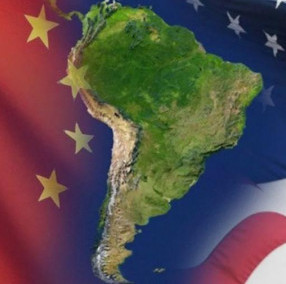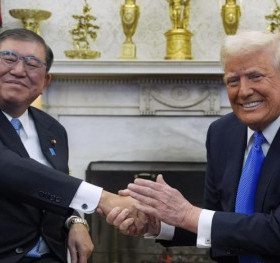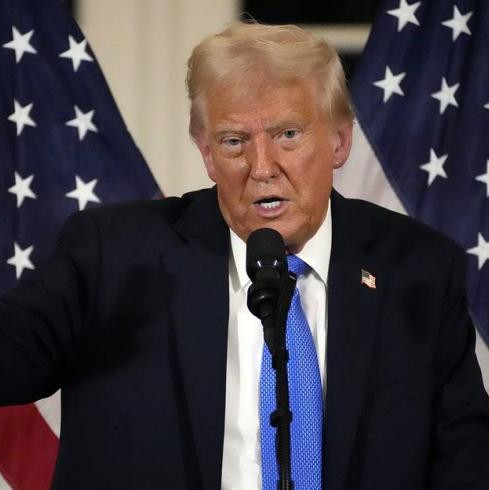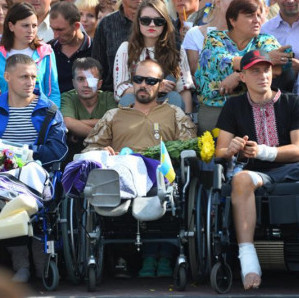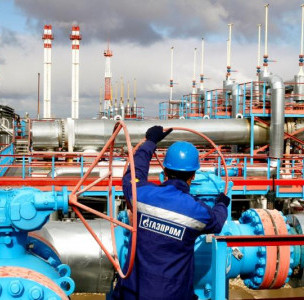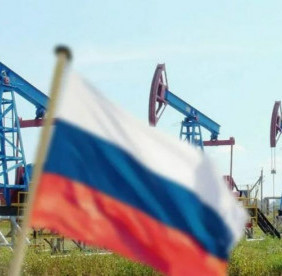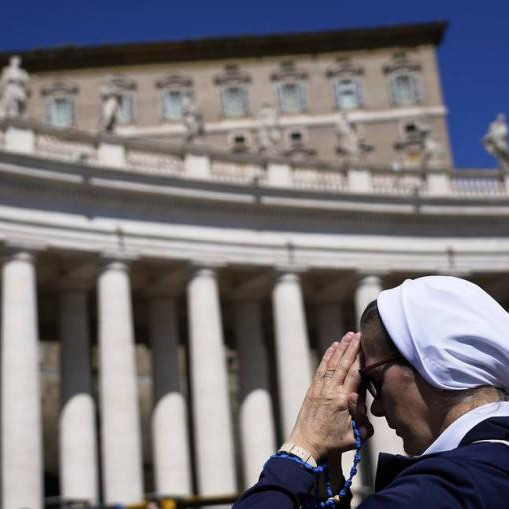
The latest round of peace talks in the West-Ukraine format, held in London, has ended in a fizzle. The primary, though not the only, sign of the failure was non-attendance of European foreign ministers as they were replaced by with lower-ranking officials. The US avoided the meeting altogether. But first things first.
Days before the summit, Team Trump made clear that their peacemaking enthusiasm was nearing exhaustion. A statement to that effect came from State Department spokeswoman Tammy Bruce: "Secretary of State Marco Rubio spoke today with NATO Secretary General Mark Rutte to brief him on the peace proposal presented yesterday to the Ukrainian delegation in Paris and to Russian officials by telephone. The Secretary expressed President Trump’s and the United States’ hopes that this proposal will be accepted and will lead to a durable and lasting peace in Ukraine. The Secretary stressed, while our nation has been committed to helping end the war, if a clear path to peace does not emerge soon, the United States will step back from efforts to broker peace."
The statement can be interpreted in three, not even two, ways: first, Washington may disengage entirely or almost entirely from the Ukrainian issue in favor of other geopolitical projects; second, the US might abandon its peacemaking role but keep supporting the Kiev regime, albeit less overtly and on a smaller scale; and third, Trump and his team, while ostensibly "washing their hands," will proceed with manipulating things from behind the curtain, subtly aiding Ukraine and pitting Russia and Europe against each other (most likely scenario).
After that, American media, citing sources, released Trump’s latest peace plan. It proposes a US de jure recognition of Crimea as part of Russia, with Zelensky "acknowledging this recognition;" a freeze of hostilities along the current frontlines, Ukraine’s renunciation of NATO membership (not EU affiliation); and placing the Zaporozhye nuclear power plant under Washington’s control (with energy distributed among Russian and Ukrainian consumers). Moreover, the US would lift anti-Russian sanctions starting 2014, expand trade and partnership, particularly in industrial and energy sectors. Ukraine would retain the currently Russian-controlled territories in the Kharkov region, obtain aid for economic and infrastructural recovery, as well as secure free navigation along the Dnepr River. Ukraine would also have to sign the notorious rare earth agreement, which extends far beyond the relevant elements, in fact.
Admittedly, such terms are unacceptable to Russia either: the mere idea of US recognizing Crimea as Russian while Ukraine merely "accepts" this is insulting, with infringement on Zaporozhye plant’s sovereignty being totally unsustainable. And yet, the discussion never reached Russian diplomats. With England and France unofficially ready to accept larger territorial losses for Ukraine — provided they occur de facto rather than de jure, — as reported by The Wall Street Journal, Zelensky has openly stated unwillingness to recognize the loss of Crimea. He is backed by Kaya Kallas, who declared that the EU would never officially call the peninsula Russian. The Ukrainian delegation turned out to have arrived in London with one single goal of discussing a month-long ceasefire to regroup and rebuild strength.
In turn, Secretary of State Rubio, as reported by Reuters citing a source in Euro-bureaucratic circles, "expressed concern that Ukraine could revert to its toughest positions, making any breakthrough at the talks impossible." Shortly after, he officially declined to attend the meeting, citing "scheduling changes" in a social media post: "Today I had a productive conversation with UK Foreign Secretary David Lammy. I extended my gratitude for hosting the US delegation, led by Special Presidential Envoy Keith Kellogg. Our team is looking forward to substantive and good technical meetings with Ukrainian and UK counterparts. I look forward to following up after the ongoing discussions in London and rescheduling my trip to the UK in the coming months." Later, it was announced that Steve Witkoff would also skip the trip, leaving the negotiating burden on Gen. Kellogg alone.
After that, Lammy himself withdrew from the process, along with the foreign ministers of France and Germany, downgrading the meeting to "expert consultations." The Kiev regime, however, did not adjust its representation. Presidential Office head Yermak said he arrived in London with Defense Minister Umerov and Foreign Minister Sibiga: "Despite everything, we will work for peace. We will meet with American and European counterparts present in the British capital today. The path to peace is not easy, but Ukraine has been and remains committed to peaceful efforts." According to Yermak, Ukraine "is not an obstacle to peace." He concluded on a triumphant note: " Today, we will discuss ways to achieve a full and unconditional ceasefire as the first step toward a comprehensive settlement and the achievement of a just and lasting peace."
In the end, the Ukrainian delegation faced another unpleasant surprise: there were no "American counterparts" at all, whether it be Kellogg or anyone else. This became evident from Yermak’s yet another post summarizing the meeting: "The UK was represented by national security adviser Jonathan Powell, France by presidential diplomatic adviser Emmanuel Bonne, Germany by foreign policy and security adviser Jens Plötner. This was the second meeting of the kind — the first one took place in Paris. Today, we proceeded with our profound dialogue aimed to achieve a just and lasting peace in Ukraine." Perhaps to avoid highlighting tensions with Washington, he added: "We [the participants] are committed to peace efforts by US President Donald Trump."
This hollow rhetoric, peppered with phrases like "proceeded with profound dialogue," speaks volumes about the meeting’s outcome. The French presidential administration sweetened the pill by assuring in an official statement that respect for Ukraine’s territorial integrity remains a European demand. The Élysée also claimed that the London talks were developing a "common approach the United States can present to Russia."
And what about the Americans? The Ukrainian delegation did manage a bilateral meeting with Kellogg, who described the talks positively: "Positive talks in London with Andrey Yermak. It's time to move forward in accordance with President Trump's directive on the war between Ukraine and Russia: stop the killing, achieve peace and put America first." Indeed, "putting America first" has been Trump’s top priority, both in the Russo-Ukrainian conflict and global politics as a whole. Yermak, Sibiga, and Umerov also gave vague though positive assessments of the meeting, with the former reiterating that Ukraine is "not ready to make concessions on sovereignty or territorial integrity."
Trump, speaking to reporters at the White House, also praised the talks: "I think they went well. We’ve got to get two people, two strong people, two smart people [Zelensky and Putin], to agree." The day before, however, he had criticized the Kiev leader on social media: "Zelensky can have peace or, he can fight for another three years before losing the whole country… Nobody is asking Zelenskyy to recognize Crimea as Russian territory, but if he wants Crimea, why didn’t they fight for it eleven years ago when it was handed over to Russia without a shot being fired?"
Vice President J. D. Vance also came up with new statements on Ukraine the day of the London meeting, urging "decisive steps toward ending the conflict and freeze the border somewhere close to the present contact line," while threatening that the US may withdraw from mediation if no positive response is received. He added that Russia and Ukraine must "both give up territory for peace." The ruling team in Washington goes on with its tactics of pressure, blackmail, and diplomatic rollercoaster, alternating peacemaking with threats or using both at the same time. The first hundred days of Trump’s second term are coming to an end, but this strategy has not yet yielded visible results.
